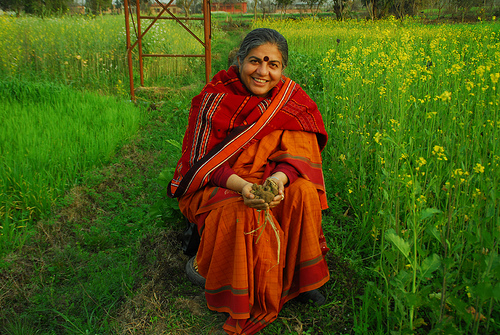feminism 101: ecofeminism
Hey there, tired activist. Are you worn out by all the activism that needs doing? Even if you focus on the Tony Abbott niche, you’re probably busy reminding him that women aren’t accessories while also asking him whether he believes in climate change yet. That’s JUST.ONE.GUY.
What if I told you there was a way to simplify your activism – combine feminism and environmentalism in one neat(ish) package? Let me tell you a little bit about ecofeminism.
What is ecofeminism?
Ecofeminism describes a philosophy that connects feminism and ecology and highlights the connection between women and nature. As with feminism, ecofeminism means different things for different people, but for many of those who identify strongly with ecofeminism, it is a philosophy with a strong spiritual element. Ecofeminists describe a deep connection between women and the earth and identify a parallel between the exploitation of women and the environment that comes from their shared history of oppression by a patriarchal Western society.
Women must see that there can be no liberation for them and no solution to the ecological crisis within a society whose fundamental model of relationships continues to be one of domination. They must unite the demands of the women’s movement with those of the ecological movement to envision a radical reshaping of the basic socioeconomic relations and the underlying values of this society.
– Rosemary Radford Ruether, New Woman/New Earth p.204
The term “ecofeminism” is believed to have been coined by Franciose d’Eaubonne in her book, Le Feminisme Ou La Mort (1974). This wasn’t the first time the ideas of ecology and feminism had been connected, however this new term was soon being used to describe a movement that gained momentum through the 1980s.
Who are the ecofeminists and what do they stand for?
While many argue that ecofeminism is not organised in such a way as to be called a movement, there are a number of prominent women who are identified as ecofeminists, such as Kenyan environmental and political activist Wangari Muta Maathai (1940-2011) and American feminist Christian theologian, Sallie McFague.
One of the most visible ecofeminists is Indian environmental activist and author Dr Vandana Shiva. Vandana Shiva claims that women have a special connection to the environment through their daily interactions with it. This connection and the knowledge built up over generations, Shiva argues, has not only been overlooked but eroded in modern society.
In her book Ecofeminism (1993) Shiva and co-author Maria Mies critique modern science and its acceptance as a universal and value-free system. They argue that rather than being value-neutral, science projects Western men’s values. Furthermore, argue Shiva and Mies, the privilege of determining what is considered scientific knowledge has been controlled by men.
Two examples Shiva and Mies draw upon are childbirth and agriculture. They argue that the medicalisation of childbirth has marginalised knowledge developed primarily by women over generations, changing it into a process that is dependent on technologies and expertise as defined by the medical community.
Similarly, agriculture has become increasingly dependent on industrially produced seeds and fertilizer. Common to both examples, two areas of life which were once deemed natural now require technological intervention as the standard.
Is it all sunshine and non-GM seeds?
While much ecofeminist thought resonates with a variety of groups – from those concerned with how knowledge is gendered to those who question the primacy of modern industrialisation, for example – ecofeminism is not without its critics.
Feminist and social ecologist Janet Biehl believes ecofeminism focuses too much on a mystical connection between women and nature. Rosemary Radford Ruether (quoted above) is also concerned that too strong a focus on mysticism is a distraction from actually improving conditions for women.
Ecofeminism grows from the idea that women are in sync with nature whereas men dominate it. You may convincingly argue that in practice this is true and that the same system exploiting women is exploiting the earth. But many feminists are reluctant to adopt essentialist arguments about what it is to be a woman, especially when claims to “women’s nature” are invoked.
Although ecofeminism isn’t for everybody, it is particularly popular in communities going through rapid industrialisation and working hard to retain and blend traditional knowledge and practices. For others it offers a philosophical framework to examine the structures that dominate in modern society in a multitude of ways…Which is pretty efficient when you think about.
Learn more about ecofeminism:
Read:Silent Spring by Rachel Carson (1962)
Listen to:Planting the Future with WangariMaathai
Watch:The Corporation with Vandana Shiva



Hey terrific article. Ecofeminism has a lot going on, especially when you apply it through systems thinking. I Love came up with 5 simple feminist-systems thinking principles inspired by ecofeminism practical value. Please check it out. ‘Ecofeminism and Systems Thinking’ published by Routledge (August 2013 so hot off the press). Just google it. I think ecofeminism could transform project and community development. Love to hear your thoughts.
Cheers
Anne Stephens
The Cairns Institute
James Cook University